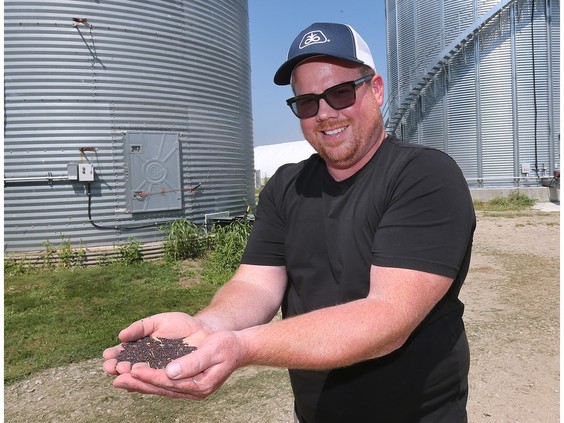Politics
China Imposes 75.8% Tariffs on Canadian Canola, Farmers Concerned

China has imposed a significant 75.8 percent anti-dumping tariff on Canadian canola seed, creating uncertainty for farmers in Essex County, Ontario. This decision, announced last week, poses potential challenges for local growers who are beginning to explore winter canola varieties, which are planted in the fall and harvested in the summer. While Essex County’s canola acreage is minimal compared to western Canada, agricultural leaders fear the ripple effects of this tariff could hinder expansion efforts in the region.
Ryan Koeslag, executive director of Ontario Canola Growers, expressed concern regarding the impact of the tariff. “We actually had pretty good success with a new variety in Essex County, so it’s just peaking up,” Koeslag stated. He added that the tariff effectively closes off the Chinese market, which is the second-largest destination for Canadian canola seed. “It’s a pretty devastating blow right now,” he remarked, urging the government to negotiate with China to alleviate the situation.
Impact on Local Farmers and Production Goals
Koeslag mentioned that efforts were underway in partnership with Archer Daniels Midland (ADM), a grain handling and oilseed processing facility based in Windsor, to increase the region’s winter canola production to 50,000 acres. In previous years, the organization hosted yield competitions, showcasing successful farms like the top producer from Blenheim, Ontario. Despite these promising developments, the newly imposed tariffs cast a shadow on future growth prospects.
Canada is recognized as the world’s largest canola producer, with approximately 45,000 acres cultivated in Ontario. However, only about 1,000 acres of that total is in Essex County, while western provinces plant over 22 million acres, supplying the majority of Canada’s canola exports to China. While farmers in Essex County have already completed their canola harvest by early July, Koeslag cautioned that if the tariffs remain in place for an extended period, the consequences could be severe.
“It’s a national issue,” Koeslag noted. “When we have these types of issues, it’s going to impact us in one way or the other.” He warned that dismissing the potential impact due to low acreage would be premature, as local farmers could still feel the effects of the tariffs in the long run.
Market Uncertainty and Future Crop Decisions
The latest trade penalty against Canadian canola seed follows China’s earlier introduction of a 100 percent tariff on processed canola oil and meal earlier this year, which some local farmers had anticipated. Scott McLean, a Harrow farmer who has been cultivating canola since 2019, acknowledged the market’s instability but expressed a degree of confidence. “I’m not terribly concerned,” McLean said, adding that canola constitutes only 10 percent of his 700-acre farm operation, which primarily focuses on cash crops like wheat, soybeans, and corn.
McLean emphasized the financial risks associated with the current economic landscape. “There’s a lot of capital exposed to land cost, land rent, farm purchase, housing, and equipment costs have never been higher,” he explained. As inflation pressures margins, he noted that farmers are reluctant to take on potential economic losses stemming from tariffs, especially when making decisions about crop rotations.
Koeslag pointed out that, unlike most Canadian producers currently entering the harvest, Essex County growers were fortunate to be shielded from immediate penalties this year. “It’s unfortunate timing for all of that 22 million acres of canola that’s being grown,” he remarked. As the situation unfolds, local farmers can only hope for a resolution that allows them to continue their efforts in canola production without the looming threat of tariffs.
-

 Politics4 weeks ago
Politics4 weeks agoSecwepemc First Nation Seeks Aboriginal Title Over Kamloops Area
-

 World5 months ago
World5 months agoScientists Unearth Ancient Antarctic Ice to Unlock Climate Secrets
-

 Entertainment5 months ago
Entertainment5 months agoTrump and McCormick to Announce $70 Billion Energy Investments
-

 Science5 months ago
Science5 months agoFour Astronauts Return to Earth After International Space Station Mission
-

 Lifestyle5 months ago
Lifestyle5 months agoTransLink Launches Food Truck Program to Boost Revenue in Vancouver
-

 Technology3 months ago
Technology3 months agoApple Notes Enhances Functionality with Markdown Support in macOS 26
-

 Lifestyle3 months ago
Lifestyle3 months agoManitoba’s Burger Champion Shines Again Amid Dining Innovations
-

 Top Stories2 months ago
Top Stories2 months agoUrgent Update: Fatal Crash on Highway 99 Claims Life of Pitt Meadows Man
-

 Politics4 months ago
Politics4 months agoUkrainian Tennis Star Elina Svitolina Faces Death Threats Online
-

 Sports5 months ago
Sports5 months agoSearch Underway for Missing Hunter Amid Hokkaido Bear Emergency
-

 Politics5 months ago
Politics5 months agoCarney Engages First Nations Leaders at Development Law Summit
-

 Technology5 months ago
Technology5 months agoFrosthaven Launches Early Access on July 31, 2025





















